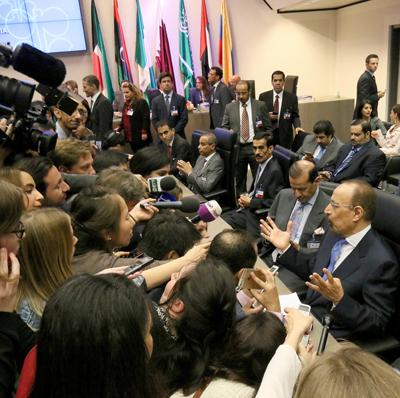You are here
Iran's Rouhani wants to 'free' economy from sanctions
By Agencies - May 24,2015 - Last updated at May 24,2015
TEHRAN — Iranian President Hassan Rouhani called Sunday for national unity to liberate the economy from international sanctions, which he compared to a form of occupation.
"We must join hands and free our economic territory which was unjustly occupied by the countries of the P5+1 [Britain, China, France, Russia, the United States and Germany] and the UN Security Council... through use of diplomatic and political tools," Rouhani said in a televised speech.
The P5+1 group is trying to negotiate a deal with Tehran aimed at preventing Iran from developing nuclear weapons, in exchange for an easing of punishing economic sanctions.
Iranian hardliners have opposed any deal curbing nuclear activities that Tehran says are for peaceful energy purposes.
The UN Security Council adopted six resolutions, four of which imposed sanctions, against Iran's nuclear and missile programmes between 2006 and 2010.
Since 2012, the United States and the European Union have also applied a series of unilateral sanctions that specifically target the energy and banking sectors.
Iranian oil exports have fallen from more than 2.2 million barrels per day (bpd) in 2011 to about 1.3 million bpd, and Iran is banned from the SWIFT global banking network.
"The enemies keep us from selling our oil," Rouhani said in the speech to mark the 33rd anniversary of the liberation of the Iranian city of Khorramshahr, a symbolic victory in the Iran-Iraq war of 1980-1988.
The banking industry is also under a form of occupation because "we cannot send or receive money" overseas, he said.
"It is as if blood was prevented from flowing in [our] veins," Rouhani added.
In early April Tehran and world powers concluded a framework agreement aiming to pave the way for a final nuclear agreement by June 30.
Political and technical experts from both sides held talks on drafting the text in Vienna on Friday with negotiations due to resume on Tuesday in the Austrian capital.
Separately, Iran's Oil Minister Bijan Zanganeh reportedly said on Sunday that the Organisation of petroleum Exporting Countries (OPEC) is unlikely to change its production ceiling when the group meets in June, according to the semi-official Mehr news agency.
"Lowering OPEC's production ceiling requires consensus between all members... under current conditions it seems unlikely that the OPEC production ceiling will change," Zanganeh was quoted by Mehr as saying.
Last month, Zanganeh said the producing group should cut its target daily crude production by at least 5 per cent, or approximately 1.5 million bpd.
OPEC will meet on June 5. At its last meeting in November, OPEC, led by oil kingpin Saudi Arabia, decided against cutting output to defend its market share, resisting calls by some members such as Iran and Venezuela to reduce production to shore up prices.
Brent oil settled down $1.17, or 1.8 per cent, at $65.37 a barrel on Friday.
Lower oil prices have caused pain for OPEC's less wealthy producers, including Iran. While the June 5 meeting in Vienna is likely to hear renewed demands from some OPEC members for a reduction in the amount of oil pumped, even officials from countries which favour a curb see it as unlikely.
Iran wants other OPEC members to make way for a rise in its exports if it succeeds in reaching a final deal with six world powers over its nuclear programme.
Related Articles
DUBAI/LONDON — A second oil price rout of 2015 has forced Arab members of the Organisation of Petroleum Exporting Countries (OPEC) to cut th
VIENNA – Saudi Arabia promised on Thursday not to flood the oil market with extra barrels even as OPEC failed to agree on output policy, wit
TEHRAN — Iran will take part in an informal meeting of OPEC countries in Algeria next month, state media reported on Thursday. "I will

















